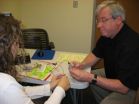Magic tricks reveal surprising results about autism
2010-10-21
(Press-News.org) Magicians rely on misdirection—drawing attention to one place while they're carrying out their tricky business somewhere else. It seems like people with autism should be less susceptible to such social manipulation. But a new study in the U.K. finds that people with autism spectrum disorder are actually more likely to be taken in by the vanishing ball trick, where a magician pretends to throw a ball in the air but actually hides it in his hand.
In the vanishing-ball illusion, a magician throws a ball in the air a few times. On the last throw, he merely pretends to throw it, making a tossing motion and looking upwards while the ball remains concealed in his hand. But observers claim to "see" the ball leaving the hand. This misdirection depends on social cues; the audience watches the magician's face. People with autism are known for having trouble interpreting social cues, so Gustav Kuhn of Brunel University and his coauthors Anastasia Kourkoulou and Susan R. Leekam of Cardiff University thought they could use magic tricks to understand how people with autism function.
For this experiment, 15 teenagers and young adults with autism spectrum disorder and 16 without autism watched a video of a magician performing the vanishing-ball illusion. Then they were asked to mark where they last saw the ball on a still image of the magician. The last place it appeared was in the magician's hand, but many people mark a position higher up and say that he threw the ball. "We strongly suspected that individuals with autism should be using the social cues less than typically developing individuals," says Kuhn—that people with autism would watch the ball rather than the magician's face, and thus have a better idea of what happened.
But the exact opposite happened. People with autism were much more likely to think the magician had thrown the ball. Kuhn speculates that this is because the people in the study were all students at a special college for autism, where they would have been taught to use social cues. When he examined where their eyes had looked, he found that, like normally-developing people, they looked first at the magician's face—but their eyes took longer to fix there. They also had more trouble fixing their eyes on the ball. The results are published in Psychological Science, a journal of the Association for Psychological Science.
"What we suggest is that individuals with autism have particular problems in allocating attention to the right place at the right time," Kuhn says. This may cause trouble in social situations, when you have to be able to pay attention to the right thing at the right time. Kuhn would like to repeat the experiment in children with autism, who may not yet have been educated in social cues, to see if they are also taken in by the illusion.
###*Gustav Kuhn describes his study, "How Magic Changes Our Expectations About Autism" in this SciVee PubCast: http://www.scivee.tv/node/25133 (click on "video + document")
For more information about this study, please contact Gustav Kuhn at gustav.kuhn@brunel.ac.uk.
The APS journal Psychological Science is the highest ranked empirical journal in psychology. For a copy of the article "How Magic Changes Our Expectations About Autism" and access to other Psychological Science research findings, please contact Keri Chiodo at 202-293-9300 or kchiodo@psychologicalscience.org.
END
ELSE PRESS RELEASES FROM THIS DATE:
2010-10-21
Conventional wisdom has long been negative on Africa. Historically, it has been seen as a failing continent, plagued by deep-rooted problems — poverty, corruption, war, and disease. But after four decades of relative stagnation, Africa has been growing rapidly. Since the 1990s, many African countries have seen economic and political improvements, more transparent elections, increased democracy and freedom of press. But these successes are not well understood.
In 2007, the National Bureau of Economic Research (NBER), the leading nonprofit economics research organization ...
2010-10-21
WASHINGTON, Oct. 20 -- Scientists and engineers from around the world will gather on the shores of Lake Ontario in Rochester, N.Y. next week to discuss some of the latest breakthroughs in lasers and optics and their applications to cutting-edge science, the development of new materials, and medicine.
Journalists are invited to Frontiers in Optics (FiO) 2010/Laser Science XXVI -- the 94th annual meeting of the Optical Society (OSA), which is being held together with the annual meeting of the American Physical Society (APS) Division of Laser Science at the Rochester Riverside ...
2010-10-21
CORVALLIS, Ore. – Severe burn injuries in children have been shown to rapidly deplete the levels of vitamin E in their body's adipose, or fat tissues, a new clinical study has found.
Stored levels of this important antioxidant were reduced more in a few weeks than might normally be possible in years.
An analysis of eight children with third-degree burns over much of their body found they lost almost half of their stored vitamin E in three weeks, even though they were being given about 150 percent of the recommended daily allowance of vitamin E and other nutrients in ...
2010-10-21
Researchers at the Hawai'i Institute of Marine Biology (HIMB), an organized research unit in the University of Hawai'i at Mānoa's School of Ocean and Earth Science and Technology have made a remarkable new discovery.
When most people envision coral, they typically think of shallow-water reef-building corals found along beaches and tropical nearshore habitats. These "typical" corals are dependent upon photosynthetic algae (also known as Symbiodinium or zooxanthellae) found in their tissues to obtain nutrients to live off of. In deeper less known waters, closely related ...
2010-10-21
(SACRAMENTO, Calif.) — A study of the options for reducing cancer incidence and mortality among women who have been treated for precancerous cervical lesions found that an annual conventional Pap smear is a cost effective strategy.
Joy Melnikow, professor in the Department of Family and Community Medicine and colleagues tested several follow-up screening strategies for the 500,000 American women diagnosed and treated for cervical intraepithelial neoplasia (CIN), abnormal cervical cell growth that can lead to cervical cancer. The first comprehensive study of its kind, ...
2010-10-21
A University of Washington Medical Center patient on Thursday, Oct. 21, will be the world's first recipient of a device that aims to quell the disabling vertigo associated with Meniere's disease.
The UW Medicine clinicians who developed the implantable device hope that success in a 10-person surgical trial of Meniere's patients will lead to exploration of its usefulness against other common balance disorders that torment millions of people worldwide.
The device being tested – a cochlear implant and processor with re-engineered software and electrode arrays – represents ...
2010-10-21
Providing computed tomography colonography (CTC) — otherwise known as virtual colonoscopy — as an alternative to conventional colonoscopy could improve colorectal cancer (CRC) screening rates, according to a study in the November issue of the American Journal of Roentgenology (www.ajronline.org).
CRC is the second leading cause of cancer in the U.S. "While colonoscopy is currently the preferred test for CRC screening, the invasive and time-consuming characteristics of the test are often cited as reasons for noncompliance with screening," said Fouad J. Moawad, lead author ...
2010-10-21
Computed tomography colonography (CTC) — otherwise known as virtual colonoscopy — is feasible in remote health centers where optimal colonoscopy is limited, according to a study in the November issue of the American Journal of Roentgenology (www.ajronline.org).
The study was performed at Fort Defiance Indian Hospital in Fort Defiance, AZ, and Tuba City Regional Health Care Center in Tuba City, AZ, both of which are rural medical centers serving Native American, mainly Navajo, populations. After brief on-site instruction, including performing a CTC examination on a volunteer ...
2010-10-21
If you're a football fanatic, or if you just enjoy a great party, you won't want to miss Super Bowl XLV. The Dallas Cowboys are hosting this year's mega-event at their brand-new stadium in Arlington. And nobody does football parties bigger than Texans.
To take full advantage of the Super Bowl experience, you need super accommodations. Luckily, you can rent a luxury home in DFW TX for the Super Bowl.
Located just 15 miles from the stadium in the affluent suburb of Colleyville, this $3 million home will impress your guests with its lofty ceilings, seven different fireplaces, ...
2010-10-21
Tarpaflex U.S, the worldwide tarps specialist are going for gold this winter with a large shipment of economy blue tarps for the new London Olympic Stadium.
A highly anticipated event, transforming London in time for the 2012 games is a difficult and complex task. Plans and progress are already full steam ahead despite the event being almost two years away. So far, the focus on efforts has been on the construction of the new, world-class Olympic stadium.
With building on the 80,000 capacity stadium underway, Tarpaflex has received a large order for blue economy tarpaulins ...
LAST 30 PRESS RELEASES:
[Press-News.org] Magic tricks reveal surprising results about autism


